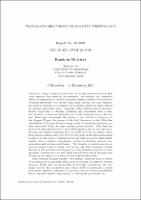| dc.description.abstract | Large complex systems tend to develop universal patterns that often represent their essential characteristics. For example, the cumulative effects of independent or weakly dependent random variables often yield the Gaussian universality class via the central limit theorem.
For non-commutative random variables, e.g. matrices, the Gaussian behavior is often replaced by another universality class, commonly called random matrix statistics. Nearby eigenvalues are strongly correlated, and, remarkably, their correlation structure is universal, depending only on the symmetry type of the matrix. Even more surprisingly, this feature is not restricted to matrices; in fact Eugene Wigner, the pioneer of the field, discovered in the 1950s that distributions of the gaps between energy levels of complicated quantum systems universally follow the same random matrix statistics. This
claim has never been rigorously proved for any realistic physical system but experimental data and extensive numerics leave no doubt as to its correctness. Since then random matrices have proved to be extremely useful phenomenological models in a wide range of applications beyond quantum physics that include number theory, statistics, neuroscience, population dynamics, wireless communication and mathematical finance.
The ubiquity of random matrices in natural sciences is still a mystery, but recent years have witnessed a breakthrough in the mathematical description of the statistical structure of their spectrum. Random matrices and closely related areas such as log-gases have become an extremely active research area in probability theory.
This workshop brought together outstanding researchers from a variety of mathematical
backgrounds whose areas of research are linked to random matrices. While there are strong links between their motivations, the techniques
used by these researchers span a large swath of mathematics, ranging from purely algebraic techniques to
stochastic analysis, classical probability theory, operator algebra, supersymmetry,
orthogonal polynomials, etc. | |

